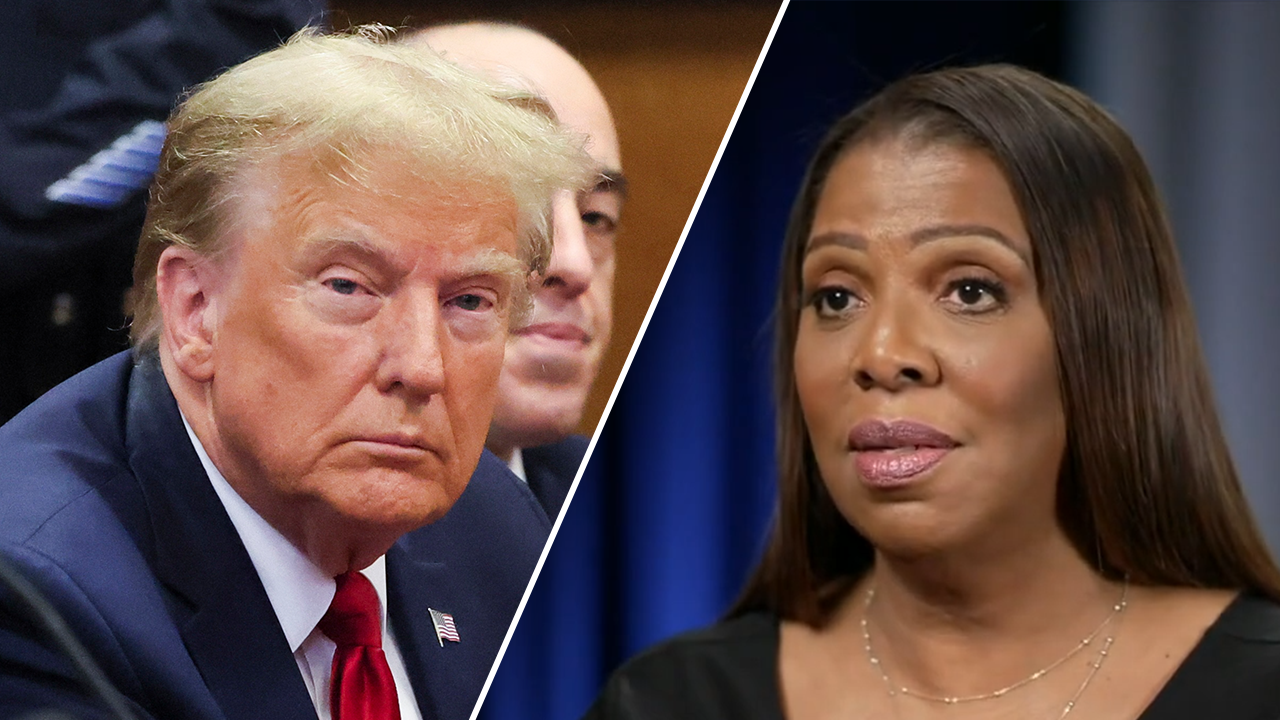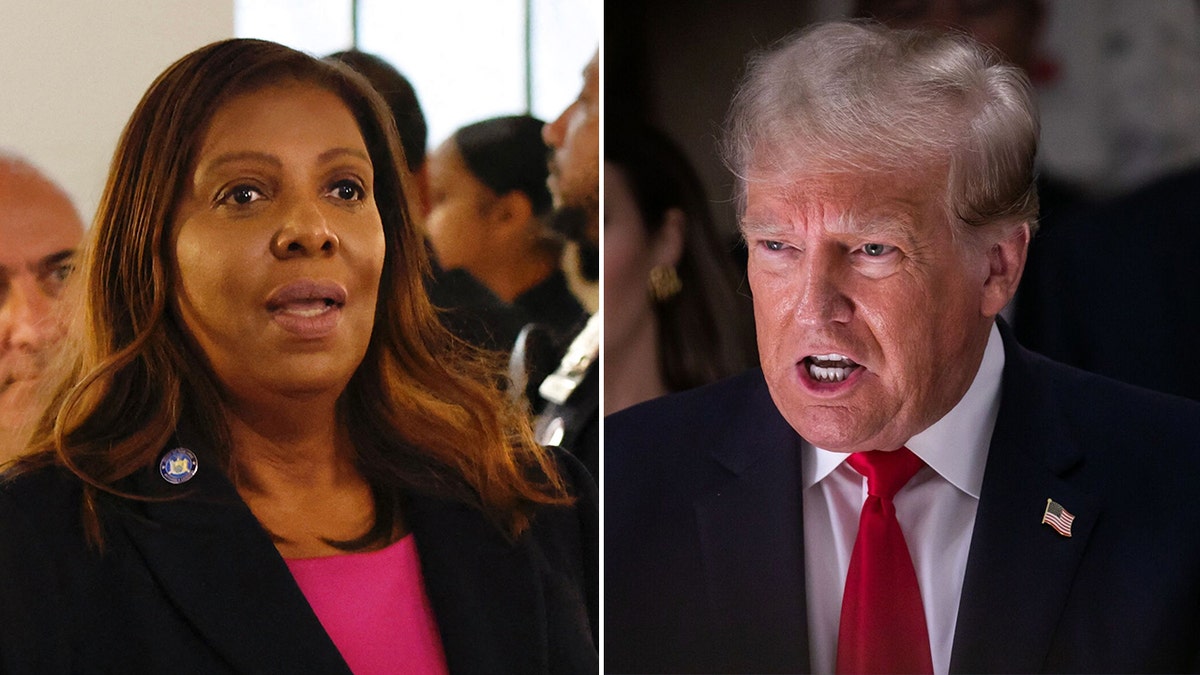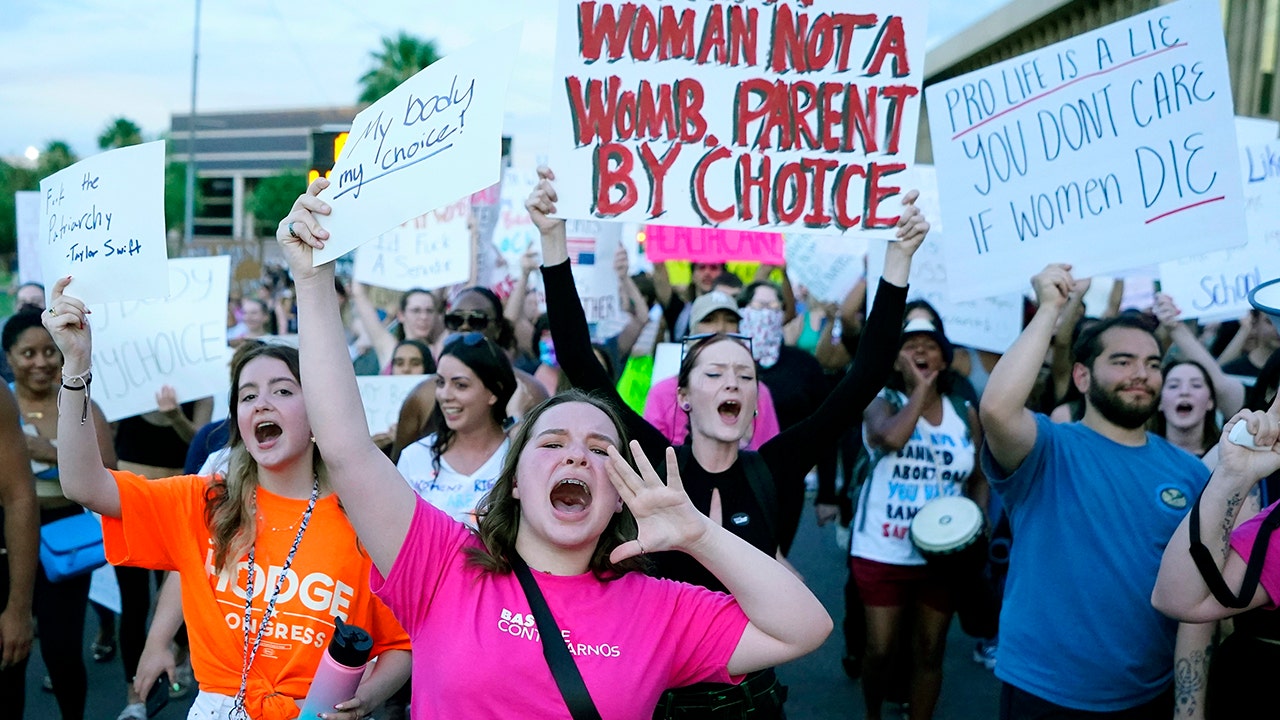Politics
NY AG Letitia James asks judge to void Trump's $175M bond in civil fraud case

New York Attorney General Letitia James is pushing the judge in former President Donald Trump’s civil fraud case to void the $175 million bond that Trump previously posted to appeal his New York civil lawsuit.
In her 26-page filing obtained by Fox News Digital, James questions whether the insurance company has sufficient funds to back it up.
Trump’s bond was posted by California-based Knight Specialty Insurance Company (KSIC), but James argued that the insurer was “not authorized” to write business in New York, stating it is a small insurer that is not authorized to write business in New York and is not regulated by the state’s insurance department, had never before written a surety bond in New York or in the prior two years in any other jurisdiction, and has a total policyholder surplus of just $138 million.
The company has a total policyholder surplus of just $138 million, the filing states. According to New York state law, smaller businesses like KSIC are not permitted to expose themselves to liabilities, like a bond, or any potential loss greater than 10 percent of their surplus.
NEW YORK AG TAKES VICTORY LAP AFTER TRUMP FRAUD RULING: ‘JUSTICE HAS BEEN SERVED’
New York Attorney General said she is “prepared” to ask the judge to seize former President Donald Trump’s assets if he cannot pay the $354 million judgement handed down in his civil fraud case. (ABC News/Screenshot/Brendan McDermid-Pool/Getty Images)
“Based on KSIC’s policyholder surplus in its most recent annual financial statement of $138,441,671, the limitation of loss on any one risk that KSIC is permitted to write is $13.8 million,” the lawyers wrote. “The face amount of the bond exceeds this limitation by $161.2 million.”
James also wrote in the filing that “KSIC is not qualified to act as the surety under this standard because its management has been found by federal authorities to have operated affiliated companies within KSIC’s holding company structure in violation of federal law on multiple occasions within the past several years.”
“KSIC does not now have an exclusive right to control the account and will not obtain such control unless and until it exercises a right to do so on two days’ notice,” the filing read.
James also wrote that the Court should not rely on KSIC’s financial summary attached to the bond as evidence that KSIC has sufficient capacity to justify writing a $175 million bond.
“That is because KSIC sends 100% of its retained insurance risk to affiliates in the Cayman Islands, where lax regulations allow KSIC to use this risk transfer to reduce the liabilities it carries on its books in a way that artificially bolsters its surplus, a practice New York regulators have dubbed “shadow insurance” and about which they have sounded the alarm,” the filing read.
For these reasons, James writes that the Court should deny the Motion and require Defendants to post a replacement undertaking within seven days of the Court’s ruling.
NY AG LETITIA JAMES BOOED AT FDNY CEREMONY WITH CHANTS OF ‘TRUMP! TRUMP! TRUMP!’

Democrat New York Attorney General Letitia James and former President Donald Trump. (Getty Images)
In September, Judge Arthur Engoron ruled that Trump and the Trump Organization had committed fraud while building a real estate empire by deceiving banks, insurers and others by overvaluing his assets and exaggerating his net worth on paperwork used in making deals and securing financing.
The judge also prohibited Donald Trump Jr. and Eric Trump from serving as an officer or director of any New York corporation or legal entity in New York for two years.
The former president has repeatedly slammed the case against him and denied any wrongdoing, calling it a “witch hunt.”
James brought the lawsuit against Trump, accusing Trump and the Trump Organization of fraudulent business practices. James claimed Donald Jr., Ivanka, and Eric, as well as his associates and businesses, committed “numerous acts of fraud and misrepresentation” on their financial statements.
Trump has pleaded not guilty on all counts.
CLICK TO GET THE FOX NEWS APP
The judge is expected to hold a hearing Monday to discuss the issues raised by the attorney general’s office. The hearing is set to run in conjunction with opening statements in Trump’s New York criminal trial.
Fox News’ Brooke Singman and Timothy Nerozzi contributed to this report.

Politics
Opinion: Is Biden a YIMBY? He certainly has good reason to embrace a pro-housing agenda

President Biden’s recent pro-housing pivot didn’t come a moment too soon. Even though the housing shortage is long-standing, well-known and worse in blue cities, high housing costs somehow sneaked up on Democrats.
By facing the crisis head on, Biden and his fellow Democrats can show voters they’re committed to expanding and strengthening the middle class and dealing with its most serious concerns. Let’s hope it’s not too late.
The housing shortage has generated deep economic resentment. Meanwhile, wealthy communities from Cupertino, Calif., to Milburn, N.J., have done everything they can to stifle construction, driving up the cost of renting or owning a home. These high prices chip away at paychecks and morale, pushing people into ever longer commutes as well as crowded and substandard housing.
The housing shortage is a dark cloud over America’s otherwise sunny economic forecast, generating dissatisfaction and endangering Democrats in the coming election.
By all the usual measures, the economy is rebounding. Inflation has fallen from the highs of the past few years to near 3%. Wages are growing, and unemployment is low. The pandemic’s worst economic consequences are over.
And yet anyone trying to afford a home is stuck in the mud of high costs. Experts think inflated housing prices are part of the reason 8 in 10 Americans in key swing states see the economy as just “fair” or “poor.” The restricted housing supply keeps workers from feeling the benefits of higher wages and moving to places where incomes are even higher.
When people are struggling, they blame those they perceive to be in charge. That helps explain the discrepancy between economic indicators and Biden’s polling.
Instead of trying to convince people that the way they’re feeling about the economy is wrong, Democrats must address the pain that working- and middle-class people are feeling. Injecting positivity into the online conversation — as Biden’s team has tried to do by countering economic doomsayers on TikTok and other platforms — will only go so far.
To his credit, the president has been quietly working on housing affordability throughout his term. The administration’s Housing Supply Action Plan, released in July, provided funding to municipalities that have made it easier to build housing, among other pro-growth measures. The administration has also promoted commercial-to-residential conversion and financed affordable housing designed to be resilient to climate change. All of this will help bring housing costs down.
But in the last few months, Biden has finally grown louder about making housing affordable by increasing supply. As Neera Tanden, the director of his Domestic Policy Council, put it: “We know we need to increase housing supply to ensure that we can bring down rents and the cost of homeownership.”
Democrats are beginning to understand the need for a rallying cry that speaks to economic anxieties and signals that the administration is focused on bringing housing costs down. It’s a message that resonates with members of an eroding middle class, many of whom believe the Democratic Party isn’t fighting for them. It’s a message that appeals to young people, minorities and every other demographic being locked out of prosperity in America. It’s a message that puts Democrats back in the conversation about the economy, an area where voters still trust Republicans more.
Is Biden a YIMBY, a “Yes in My Backyard” advocate for increasing housing supply? Whether or not he calls himself one, his work and rhetoric on the issue suggest he is.
By publicly embracing YIMBYism as an ideology and an agenda, Biden can align himself with a bipartisan majority of Americans who believe in easing zoning restrictions to allow more housing to be built. And he can signal to those struggling with housing costs that he has their backs.
Housing offers Democrats a chance to talk about rebuilding an America that works for everyone, one with a thriving, growing, expanding middle class. The administration has to show voters it understands that current housing prices are unacceptable and that it will do what it takes to bring them down. Until more people believe they will one day be able to buy a home, pessimism about access to opportunity will persist, and so will the risk to Biden’s reelection effort.
Laura Foote is the executive director of YIMBY Action and a member of the board of Up for Growth.
Politics
Which states could have abortion on the ballot in 2024?

- Since the U.S. Supreme Court overturned Roe v. Wade in 2022, most Republican-controlled states have implemented new abortion restrictions, and 14 ban it at every stage of pregnancy.
- Voters in 7 states have sided with abortion rights supporters on ballot measures.
- It is not yet clear how many states will vote in November on measures to preserve abortion access.
South Dakota advocates submitted petitions Wednesday in their effort to amend the state constitution to include the right to abortion, at least under some circumstances.
Signatures are also expected to be turned in Friday in Missouri for a ballot measure there.
The efforts in both states are part of a movement to put abortion rights questions to voters since the U.S. Supreme Court overturned Roe v. Wade and removed the nationwide right to abortion.
OUTSPOKEN PRO-ABORTION GOVERNOR GETS SPEAKING SLOT AT VATICAN SUMMIT
Since that 2022 decision, most Republican-controlled states have new abortion restrictions in effect, including 14 that ban it at every stage of pregnancy. Most Democrat-dominated states have laws or executive orders to protect access.
Additionally, voters in seven states — California, Kansas, Kentucky, Michigan, Montana, Ohio and Vermont — have sided with abortion rights supporters on ballot measures.
It’s not clear yet how many states will vote on measures to enshrine abortion access in November. In some, the question is whether amendment supporters can get enough valid signatures. In others, it’s up to the legislature. And there’s legal wrangling in the process in some states.
Some of the efforts have already failed to reach ballots. Wisconsin’s legislative session ended without a state Senate vote on a measure that the House approved to ask voters to ban abortion after 14 weeks. Iowa lawmakers did not approve a measure before their session ended this year to ask voters to find that there’s no constitutional right to abortion; Pennsylvania lawmakers previously pursued a similar amendment, but it’s not expected to be added to the ballot there this year. A Louisiana measure to enshrine abortion rights in the state constitution died in committee and one in Maine effectively died when it fell short of receiving the approval of two-thirds of the House.
Protesters shout as they join thousands marching around the Arizona Capitol after the Supreme Court decision to overturn the landmark Roe v. Wade abortion decision Friday, June 24, 2022, in Phoenix. (AP Photo/Ross D. Franklin)
WHAT’S SECURELY ON 2024 BALLOTS?
FLORIDA
The state Supreme Court ruled on April 1 that a ballot measure to legalize abortion until viability could go on the ballot despite a legal challenge from state Attorney General Ashley Moody, who argued that there are differing views on the meaning of “viability” and that some key terms in the proposed measure are not properly defined.
Advocates collected nearly a million signatures to put a state constitutional amendment to legalize abortion until viability on the ballot, surpassing the nearly 892,000 required.
Sixty percent of voters would have to agree for it to take effect.
Abortion is illegal in Florida after the first six weeks of pregnancy under a law that took effect May 1.
MARYLAND
Maryland voters this year will also be asked whether to enshrine the right for women to end their pregnancies in the state’s constitution in a ballot question put before them by lawmakers last year. The state already protects the right to abortion under state law and Democrats outnumber Republicans 2-1. Abortion is allowed in Maryland until viability.
NEW YORK
New York lawmakers agreed to ask voters to bar discrimination on the basis of pregnancy, pregnancy outcome and reproductive healthcare as part of a broader equal protection amendment. It would also bar discrimination on the basis of sex, sexual orientation, gender identity, national origin and disability. The language of the constitutional amendment does not mention abortion specifically. Abortion is allowed in New York law until viability.
WHERE ELSE COULD ABORTION BE ON THE BALLOT IN 2024?
ARIZONA
A signature drive is underway to add a constitutional right to abortion in Arizona. Under the measure, the state would not be able to ban abortion until the fetus is viable, with later abortions allowed to protect a woman’s physical or mental health. Supporters must gather nearly 384,000 valid signatures by July 4.
Abortion is currently legal for the first 15 weeks of pregnancy in Arizona. An Arizona Supreme Court ruling in April said enforcement could begin soon for a near-total ban that was already on the books. But on Thursday, the governor signed a bill repealing that law, which is still expected to be in effect for a time.
ARKANSAS
Proponents of an amendment to allow abortion in many cases have until July 5 to gather nearly 91,000 valid signatures to get it on the Nov. 5 ballot. The measure would bar laws banning abortion in the first 20 weeks of gestation and allow abortion later in pregnancy in cases of rape, incest, threats to the woman’s health or life, or if the fetus would be unlikely to survive birth. Because it allows limits as soon as 20 weeks, the proposal does not have the support of Planned Parenthood Great Plains, which includes Arkansas. The state has a ban on abortion at all stages of pregnancy with narrow exceptions.
COLORADO
Advocates for a ballot measure to add constitutional protections for abortion, including requiring Medicaid and private health insurers to cover it, have turned in signatures to have it placed on the ballot. The secretary of state’s office has until May 17 to determine whether there are enough valid signatures. More than 124,000 are required.
Amending the state constitution requires support of 55% of voters.
Those backing a dueling measure — a law to ban abortion — did not turn in signatures, and the measure will not go before voters.
Abortion is legal at all stages of pregnancy in Colorado.
MISSOURI
Missouri advocates for abortion access are expected to turn in signatures on Friday, two days ahead of their deadline to submit more than 171,000 to ask voters to approve a constitutional amendment to guarantee abortion until viability.
A group of moderate Republicans have abandoned for this year efforts for an alternate amendment that would have allowed abortion up to 12 weeks and after that with only limited exceptions.
Abortion is currently banned in Missouri at all stages of pregnancy with limited exceptions.
MONTANA
Abortion rights proponents in Montana have proposed a constitutional amendment that would bar the government from denying the right to abortion before viability or when it’s necessary to protect the life or health of the pregnant person. After a legal battle over the ballot language, the Montana Supreme Court on April 1 wrote its version of the language that would appear on the ballot if supporters gather more than 60,000 signatures by June 21. Abortion is legal until viability in Montana under a 1999 Montana Supreme Court opinion.
NEBRASKA
Advocates are trying to collect about 125,000 signatures needed by July 5 to put a constitutional amendment before voters to protect abortion rights until fetal viability. A competing petition effort would add a constitutional amendment that mirrors a law adopted last year that bans abortion after 12 weeks, with some exceptions.
NEVADA
Signatures are being gathered to place an abortion access amendment on Nevada’s ballot in November. Under the amendment, abortion access for the first 24 weeks of pregnancy or later to protect the health of the pregnant person, which is already assured under a 1990 law, would be enshrined in the constitution. It requires more than 102,000 valid signatures by June 26 to place the measure on the ballot. Voters would need to approve it in both 2024 and 2026 to change the constitution.
The measure is one of several attempts by Nevada abortion rights groups to get a ballot question before voters in 2024 or 2026.
SOUTH DAKOTA
South Dakota advocates said they submitted more than 55,000 signatures — 20,000 more than required — to get a measure on the ballot that would loosen restrictions but does not go as far as many abortion rights advocates would like. It would ban any restrictions on abortion in the first trimester of pregnancy. It would allow the state in the second trimester to “regulate the pregnant woman’s abortion decision and its effectuation only in ways that are reasonably related to the physical health of the pregnant woman.” An abortion ban would be allowed in the third trimester, as long as it included exceptions for the life and health of the woman. Planned Parenthood is not supporting the measure.
Abortion in the state is now banned at all stages of pregnancy with narrow exceptions.
Politics
Gazans thank U.S. campus protesters. Israel condemns what it sees as 'Nazi-like behavior'

People across the Gaza Strip sent messages of appreciation to demonstrators on U.S. campuses, thanking them for their protests against the Israel-Hamas war.
Children, parents and medical staff assembled in the courtyard before Al Aqsa Martyrs Hospital in central Gaza on Wednesday, with many of them unfurling banners carrying university insignia with “Thank you for supporting our cause.”
Others brandished signs that said, “Your voices pierce the wall of silence and reach the victims in Gaza,” “The killing of children in Gaza must stop” and “Palestine is everywhere.”
In recent days, as protests and encampments have spread on dozens of U.S. campuses, people in Gaza have taken note of the outpouring of solidarity, both in the United States and abroad.
They in turn have responded — on social media, in rallies, in videos, by words scribbled on tents — with messages of support of their own. Many view the protests as a positive omen in a time of unrelenting bleakness in Gaza.
At another event, in Deir al Balah, others hoped for similar protests to spread in European and Arab countries.
“This was a gathering of thanks and pride for the efforts by students in American universities,” said Baraa Safi, an English teacher interviewed by a local broadcaster on Wednesday.
“It makes a big difference in our lives and it gives us hope that people are still hearing us; that people want to help us, stand with us and end the war we’re living through every day.”
Universities across the U.S. have been rocked since mid-April by demonstrations demanding universities’ endowments divest from Israel-linked investments and companies and calling on Israel to end its bombardment and ground attacks in the Palestinian territory.
Israel’s war on the Hamas militant group has lasted nearly seven months and has killed more than 34,000 people and wounded more than 77,000, according to Hamas health authorities in Gaza. The figures do not distinguish between civilians and combatants, but officials, aid groups and activists say most of the casualties are women and children.
Israel launched its military offensive in Gaza Strip after the Oct. 7 attack, when Hamas operatives stormed more than 20 sites in southern Israel, killing roughly 1,200 people and taking about 250 hostage. Slightly more than half of the hostages are believed to remain in Gaza, including 34 that are presumed dead by Israeli authorities.
Israel’s ambassador to the United Nations characterized the U.S. campus protests as “the murderous cries of the pro-Palestinian mobs” and castigated universities for allowing “Nazi-like behavior.”
“We always knew that Hamas hides in schools,” Gilad Erdan said in a speech to the U.N.’s General Assembly on Wednesday. “We just didn’t realize that it’s not only schools in Gaza. It’s also Harvard, Columbia and many elite universities.”
He also accused the U.N. of spreading “anti-Israel vitriol” and said the organization’s “days were numbered.”
The protests in the U.S. have added to domestic and international pressure on President Biden to push through a deal between Hamas and Israel that would end the fighting and release hostages and other detainees.
On Wednesday, Secretary of State Antony J. Blinken said “there is a proposal on the table” and “the time is now” for a deal. He blamed Hamas for the delay, a charge the group’s leaders denied.
On Thursday, Hamas said its negotiating team would return to Egypt soon for additional talks and a response to a proposal made this week.
The group’s chief, Ismail Haniyeh, said in a call Thursday to Qatari Emir Sheikh Tamim bin Hamad Al Thani that Hamas was studying the cease-fire proposal with a “positive spirit.”
Negotiations have stumbled over the permanence of a cease-fire and whether the displaced will be able to return to their homes in Gaza. Mediators have offered a 40-day cease-fire and exchange of Israeli hostages and many Palestinian detainees.
-

 News1 week ago
News1 week agoLarry Webb’s deathbed confession solves 2000 cold case murder of Susan and Natasha Carter, 10, whose remains were found hours after he died
-

 World1 week ago
World1 week agoHaiti Prime Minister Ariel Henry resigns, transitional council takes power
-

 News1 week ago
News1 week agoFirst cargo ship passes through new channel since Baltimore bridge collapse
-

 World1 week ago
World1 week agoUS secretly sent long-range ATACMS weapons to Ukraine
-

 World1 week ago
World1 week agoSpanish PM Pedro Sanchez suspends public duties to 'reflect'
-

 News1 week ago
News1 week agoAmerican Airlines passenger alleges discrimination over use of first-class restroom
-

 Movie Reviews1 week ago
Movie Reviews1 week agoHumane (2024) – Movie Review
-

 Education1 week ago
Education1 week agoVideo: Johnson Condemns Pro-Palestinian Protests at Columbia University











